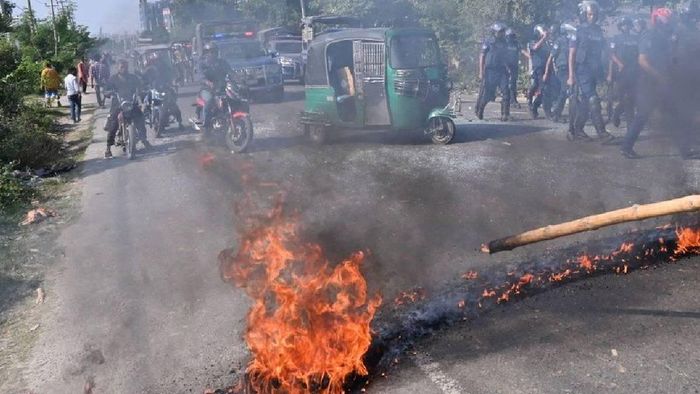Two Bangladeshi opposition activists killed in anti-government protests
Two Bangladeshi opposition activists were killed on Tuesday as a three-day protests spearheaded by the Bangladesh Nationalist Party (BNP) and Jamaat-e-Islami turned into violent clashes with police. This uprising was sparked by the recent murder accusations levelled against its senior leaders, as well as calls for Prime Minister Sheikh Hasina to step down ahead of future elections.

- Nov 01, 2023,
- Updated Nov 01, 2023, 8:20 AM IST
Two Bangladeshi opposition activists were killed on Tuesday as a three-day protests spearheaded by the Bangladesh Nationalist Party (BNP) and Jamaat-e-Islami turned into violent clashes with police. This uprising was sparked by the recent murder accusations levelled against its senior leaders, as well as calls for Prime Minister Sheikh Hasina to step down ahead of future elections.
The nationwide protests, which saw highways and railroads shut, resulted in bloodshed in a number of cities and towns. Two BNP members were slain in the town of Kuliarchar, which is located north of the capital, Dhaka.
There were also reports of violence and fatalities in Kishoreganj, Sylhet, and Comilla, where confrontations between BNP members and police resulted in four deaths. Protesters set fire to buses and engaged in clashes with police personnel, throwing petrol bombs and missiles at the officers. Police forces, on their part, deployed rubber bullets and tear gas to disperse the enraged masses, but at least 15 officers were hurt during the fights. Following a protest on Saturday in which more than 100,000 supporters of the two major opposition parties requested a free and fair election overseen by a neutral administration, the BNP initiated their transit blockage.
This development comes after the authorities charged BNP chairman Mirza Fakhrul Islam Alamgir and around 150 other high-ranking party members with the death of a police officer during previous protests. The rising violence has sparked international alarm, with seven countries, including the United States, Australia, the United Kingdom, Canada, and Japan, urging caution and a stop to violence while pushing for collaboration to achieve a free and fair election.
Mirza Fakhrul Islam Alamgir, the 75-year-old Secretary-General of the Bangladesh Nationalist Party (BNP), is currently helming the party due to the house arrest of the BNP chairwoman and former premier, Khaleda Zia, and the exile of her son in Britain. Zia is facing charges of corruption. Dhaka law enforcement agencies have stepped up their actions against opposition activists and supporters, with a total of 1,727 individuals detained in the previous week. Moreover, charges of participation in violent activities on Saturday have been laid against 1,544 opposition leaders and activists. The escalating tension in Bangladesh underscores the pressing need for international intervention and diplomatic initiatives to reestablish peace and stability in the nation.